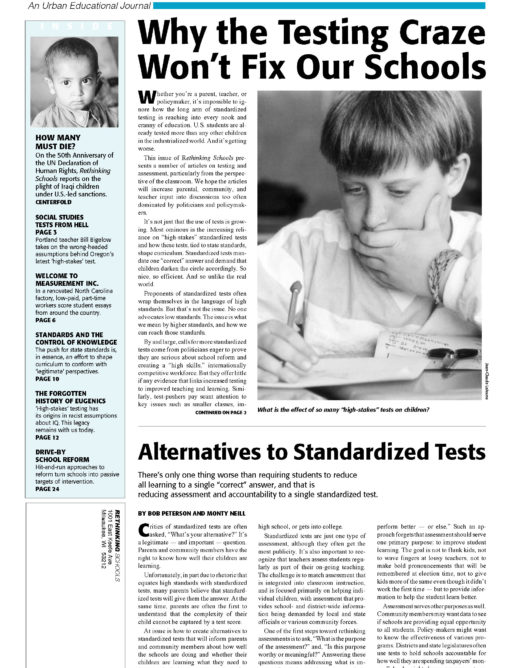Preview of Article:
Standards and the Control of Knowledge
How can parents and educator make sense of the increasing reliance of state-mandated standards and tests? How might such standards impact efforts to forge a truly multicultural curriculum?
The standards and tests by design visit on teachers and students a particular and singular view of the “basics” of history, geography, literature, art, and ways of looking at and thinking about truth. They are an effort to put an end to the most valuable asset of a multicultural society: its vibrant cacophony of views about what constitutes truth, knowledge, and learning, and about what young children ought and ought not to learn at school. Standardized curriculum and tests insist upon one set of answers, and only one.
While standardized testing and rankings by test score have long been a part of the educational landscape, the effort to install national tests and reliance on statewide standardized testing is now on an entirely unprecedented scale. This major shift in national and state educational policy was initiated during the presidency of George Bush.
Lamar Alexander, Bush’s Secretary of Education and former Republican governor of Tennessee, sought and received Congressional authorization to create a commission to study the feasibility of establishing national educational standards tied to testing. That report, Raising Standards for American Education, arrived on Jan. 24, 1992, and marked the beginning of this latest effort to shift curriculum decisions away from local authorities, schools, and teachers toward centralized, bureaucratic state control. Now, more than ever, the major issues of what and how to teach are being decided by politicians, government agencies such as the National Goals Panel, state legislatures, state boards of education, and a raft of appointed committees, panels, and commissions.
That tests are intended to mandate control of the culture is not a controversial claim. The architects of these policies proclaim it. The 1992 report, Raising Standards for American Education, asserts that national educational standards would “bind together a wide variety of groups into one nation,” providing “shared values and knowledge” which will serve “as a powerful force for national unity.” Lauren Resnick, a chief academic advocate for testing, a former president of the American Educational Research Association, and a director of the New Standards Project, argued, “Without performance standards, the meaning of content standards is subject to interpretation, which if allowed to vary would undermine efforts to set high standards for the majority of American students.” (italics added)
Linking standards and curriculum to high-stakes testing is a powerful and pervasive way to ensure the continued hegemony of the dominant culture. Or, to use the more apt language of Edward Said, the distinguished Palestinian-American scholar, it is a late 20th century form of cultural imperialism.</p

